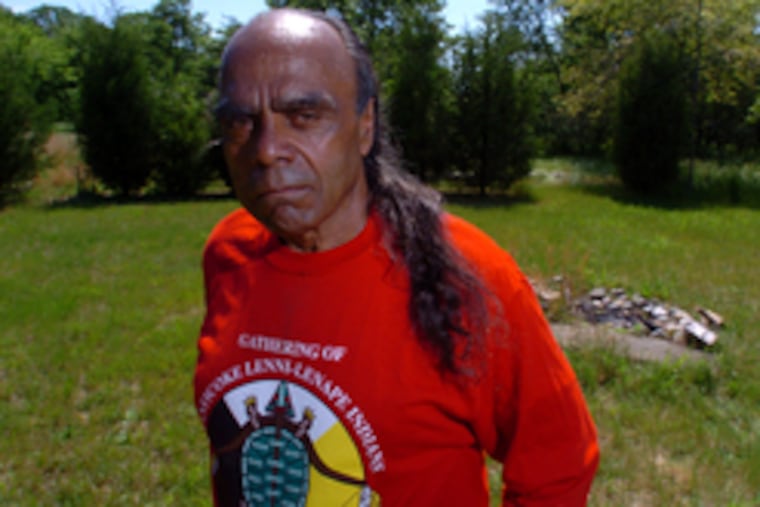Strengthening the voice of the Lenni Lenape
BRIDGETON, N.J. - Ask Mark "Quiet Hawk" Gould to tell you about his mother, and he laughs - a sharp, short hoot followed by a smile.

BRIDGETON, N.J. - Ask Mark "Quiet Hawk" Gould to tell you about his mother, and he laughs - a sharp, short hoot followed by a smile.
Chief Gould, 66, sits in the tribal headquarters of the Nanticoke Lenni Lenape Indians on a couch under pictures of past chiefs and elders. He wears a bright red T-shirt with the names of all the tribal families on the back of a turtle, the tribe's symbolic animal.
He's telling tales about his mother, Marion "Strong Medicine" Gould. And suddenly, he falls silent.
Strong Medicine, who was named for her fortitude and her skill as an herbalist, is 86 now and in declining health.
"She has good days and bad days," her son says.
Marion Gould is the subject of Amy Hill Hearth's latest book,
"Strong Medicine" Speaks: A Native American Elder Has Her Say
(Atria, $26.99). It is constructed as an oral history, with most of the narrative told from Marion Gould's point of view.
Hill Hearth also wrote
The
Delany Sisters: Having Our Say
, another oral history that became a national best seller and was turned into a Peabody Award-winning play. And she is coauthor - with U.S. Rep Nancy Pelosi, Speaker of the House of Representatives - of the soon-to-be-released
Know Your Power: A Message to America's Daughters
.
"Strong Medicine
" tells Marion Gould's - and the tribe's - history of making the transition from a nearly unknown, ignored people to one with a strong presence in the local community.
"People used to not say that they had Indian ancestry," Hill Hearth said in a recent phone interview from her home in Little Silver, N.J.
In a society with long-held prejudices against both Indians and blacks, Gould's family, the Purnells, found it easier in the 1930s to identify themselves as "colored." Her mother had a mix of Indian and Caucasian heritage; her father's background was Indian and black. And while African Americans did not have all the advantages of their Caucasian counterparts, at least they were not moved to reservations.
"We kept very quiet because of the way things were. We were untrusting," Mark Gould says. "We called ourselves the invisible people because we were right alongside of you and you didn't even know it."
That kind of "passing" continued until as late as 1978 when Congress passed the American Indian Religious Freedom Act, to protect traditional religious rights of American Indians, Eskimos, Aleuts and Native Hawaiians.
Mark Gould says times and mentalities shifted from his mother's generation to his own. He did not hide who he was, and says he faced prejudice as a child and discrimination when he worked as a construction superintendent in Washington, D.C.
In 1978, the same year Congress passed the American Indian Religious Freedom Act, Gould moved his family back to Bridgeton because he was asked to help regroup the tribe. They started by meeting anywhere that would provide free space. In 1982, the tribe became a federally recognized nonprofit organization.
The reorganized tribe started with about 800 people. Today, it counts about 3,800 official members - those with at least one grandparent in the Lenni Lenape bloodline. Most live in Salem, Cumberland and Gloucester Counties.
Gould estimates that the tribe has an additional 7,000 unregistered members - individuals who refuse to join an organization recognized by the U.S. government.
Hill Hearth's interest in the Lenni Lenape was sparked by her father, who said his family had an ancestral connection to the tribe.
She earned the tribe's trust by first calling the tribal historian and requesting permission to visit. She was invited to return repeatedly and even accompanied tribal members to the Smithsonian's National Museum of the American Indian in Washington in April 2005.
"She came in with an open mind instead of being on a mission," says Tyrese "Brightflower" Gould, 44, who is Mark Gould's daughter, Marion Gould's eldest granddaughter, and economic development specialist for the tribe.
Hill Hearth met Marion Gould a month after her trip to Washington.
"We just really clicked," says Hill Hearth. "She was very forthcoming. . . . It was unusual for a Native American elder, especially a woman, to speak to the outside world, because their words have been taken from them."
"Strong Medicine" Speaks
has increased awareness of the tribe, and now members say they are open to those who want to learn more about who they are and what they do.
"There are so few books out there that tell the true story of Indians," Marion Gould says. "Some of it's our fault because we don't like to talk to outsiders, so it's hard for people to get good, firsthand information."
Until now.